Asian Cup 2019: Does Yemen's Jan Kocian have the toughest job in world football?
- Published
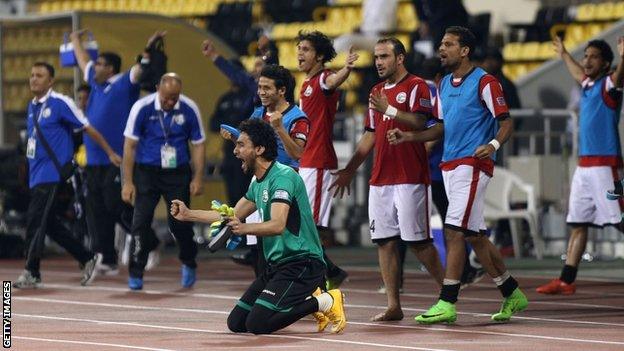
Yemen played Asian Cup qualifiers in Doha, with rare victories sealing their place at the tournament for the first time
Reaching the Asian Cup finals for the first time would be no small achievement for Yemen at the best of times. But doing so as war and famine push the poorest country on the Arabian peninsula into the abyss has made it a minor miracle.
This is no ordinary tale of footballing success against the odds. Yemen's story includes players kidnapped by extremists. Some can be found fighting in the mountains. Others are dead.
As Yemen prepare to get their campaign under way in the United Arab Emirates - they are outsiders in a group featuring Iran, Iraq and Vietnam - the tournament offers a small degree of respite for a nation ravaged by war and famine.
When they kick off against Iran in Abu Dhabi on 7 January they'll be serious underdogs. Their opponents are ranked 29th in the world by Fifa; Yemen sit 135th. But as Syria and Iraq have illustrated in recent years, turmoil can raise a team's game.
A country sliced in two, a game turned to rubble
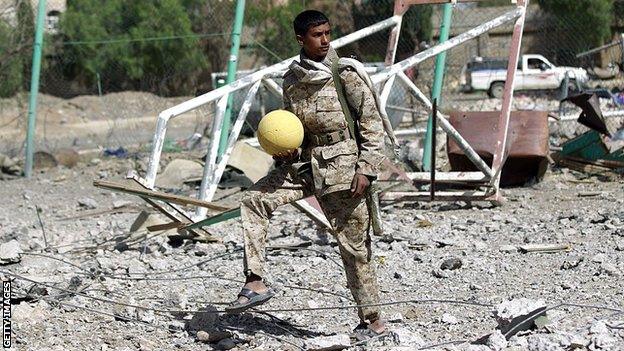
Amid the destruction, a football. An armed Shiite Houthi rebel holds a ball at the compound of Sanaa's al-Yarmuk football club, which was reported hit by an air strike by the Saudi-led coalition the previous day in 2015 in the Yemeni capital's northern al-Rawda district
Football has ground to a halt in Yemen. The league is suspended and the infrastructure has all but collapsed. Stadiums are turned to rubble, clubs disintegrating.
It is all a direct consequence of war. The 2015 escalation of the conflict between the internationally-recognised Hadi government and Houthi rebels has engulfed Yemen in unspeakable torment. The UN says 6,800 have been killed and at least 10,700 injured in fighting.
Hunger and disease have compounded the tragedy. Save the Children estimates suggest 85,000 children under five may have died of severe acute malnutrition, while 14 million people are at risk of famine according to the UN.
The country has been sliced in two by this proxy war.
The UK and US have been criticised for their support of the Saudi-led coalition that backs President Hadi.
Iran backs the Houthi, who control the mountainous north-west, including the capital Sanaa. Al Qaeda and other local factions only cloud the picture further.
Yet despite shattered families and homes, Yemenis also press on with their lives. According to sports journalist Bashir Senan, they have little inclination to pick through the geopolitical stew in which their country is simmering, but they are looking forward to that first meeting with Iran in Group D of the Asian Cup.
The players are also keen to focus on football, but that's not easy. Some have managed to find clubs outside Yemen, many in Qatar, but for those still based at home, international games have been their only competitive matches for the past four years.
Even when the few clubs still functioning manage to arrange local tournaments the war is always lurking. Chilling video, external shows rockets lighting up the sky at one such match as spectators perch on grubby plastic chairs by the side of the pitch.
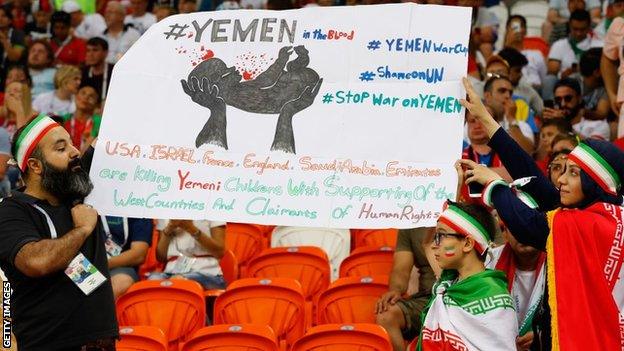
Yemen were not at the 2018 World Cup but these Iran supporters made their protest against the war involving the two countries during the match against Portugal
Kidnappings and cattle trucks: A preparation like no other
For new coach Jan Kocian, the challenges of preparing his team for a major international tournament are stark - and varied.
Those still lucky enough to be attached to functioning clubs earn pocket money at best, forcing them to drive taxis or work in supermarkets to make ends meet. Others have joined the fighting; several international players have died in the conflict.
"I have to think about doing something else to earn money," Ammad Amr Talal told a camera crew recently on the side of the dusty patch of waste ground on which Al-Tilal, one of Yemen's biggest clubs, now train. "Maybe I'll join the army."
One member of Kocian's team says that despite a full-time job he still struggles to earn enough to live. Despite that, he says he had to fund his own journey to join the national squad's Asian Cup preparations in Saudi Arabia.
Complaints against Yemen's Football Association are rife, although players are wary of making waves. The FA walks a fine line between the country's warring factions and is struggling to organise the Asian Cup campaign.
The training camps should have been up and running before November, say critics, but the finances and logistics are daunting. A coalition-enforced air embargo means there are tales of risky trips to cross the few land borders still open and voyages in ships transporting cattle for slaughter.
One player was kidnapped by extremist groups as he returned home from a game during the qualification campaign. "I had been left to a 48-hour road trip through some of the most dangerous territory in the country," he claims, preferring to remain anonymous.
Politics continued to play havoc with Yemen's preparations as the Asian Cup approached. In early December, Saudi Arabia reportedly blocked the team from travelling to Qatar for a training camp and several friendlies, sending them instead on a hastily-arranged jaunt to Malaysia.
'I've only played three top-level matches in 2018'
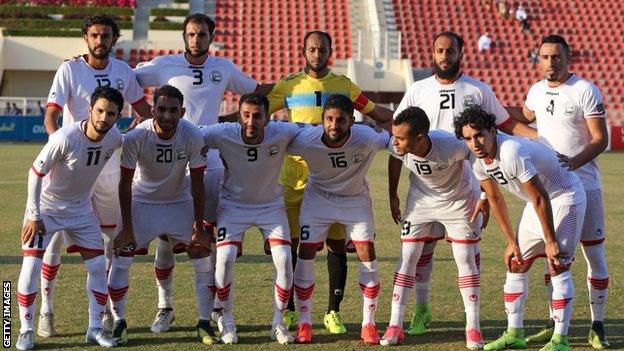
For some of Yemen's players, the Asian Cup could provide a route to a new life overseas
Yemen does not have a glorious footballing history. Fans have spent decades honing a philosophical approach - avoiding a drubbing has often been cause to celebrate.
They have never won an Arabian Gulf Cup match despite having played 27 times in the regional tournament, but triumphed twice and drew four times during the qualification campaign for the 2019 Asian Cup.
Just a few hundred Yemeni fans were in the stands in Qatar to cheer the team's "home" appearances, but enthusiasm back home among a population desperate for good news rose alongside the points tally. The excitement peaked in March, when Abdulwasea Al Matari scored the two goals that beat Nepal and sealed a berth in the finals.
However, Abraham Mebratu, the Ethiopian coach who steered Yemen through the campaign, was gone within three months, complaining about a lack of financing and keen to take up an opportunity to lead his home nation.
In addition to the victory over Nepal, Yemen's underemployed team played just three friendlies in 2018.
"I've played three top-level matches in 2018," says Fouad Al Omeisi. The 29-year-old midfielder is lucky - his club, Al Ahli Sanaa in the capital, still has its head above water. However, the "transportation allowance" he is paid is not even enough to fund regular gym visits.
One team-mate struggles to fit training around a 10-hour shift driving a bus. He earns $6 (£4.70) a day.
"The emotional and psychological stress caused by the war" only makes the effort to stay fit and sharp harder, Al Omeisi adds.
The toughest job in football?
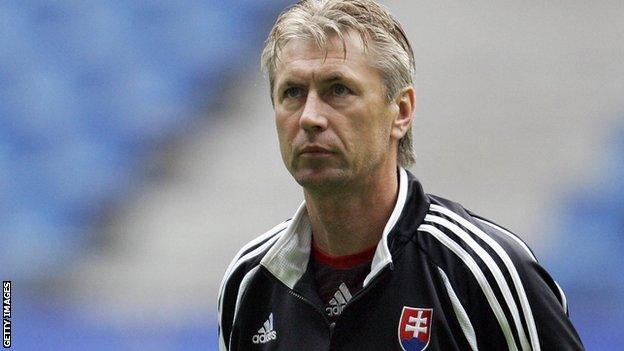
Jan Kocian managed Slovakia between 2006 and 2008 and also had a spell as Austria's assistant manager
Slovakian manager Kocian knows a thing or two about how political upheaval can impact on football.
He won the last of his 26 international caps just months before Czechoslovakia dissolved. However, 1993's Velvet Divorce, external bears no comparison to the horrors stalking this Yemen team.
Kocian arrived in Saudi Arabia in November to start preparing the squad selected by the FA to take its bow on the world stage. Tall, lean and enthusiastic, he brushes aside suggestions he may have taken on the toughest coaching job in the world.
"The political situation makes for some unusual conditions for training a national team," he admits. "For one thing, I won't enter the country; that's in my contract. But it's an honour to lead this team."
Favouring a technical, passing style, Kocian could prove a perfect fit for Yemen's young squad. The former centre-back never played for Slovakia, but during a stint in 2006-08 managing his home nation he did blood a 20-year-old Marek Hamsik, Slovakia's talisman ever since.
Kocian says his players are keen and focused, and avoid talking about the problems at home, just as the break-up of Czechoslovakia "was never a topic among footballers".
But that does not mean the devastation is not on their minds. Offering Yemenis a glimpse of hope, an escape from the horrors in which they are trapped, pushes the team to raise its game, according to veteran goalkeeper Mohammed Ayash.
"This tournament is a way to give people a little joy and relief," adds sports journalist Omar Al Masri. "It's a big deal. People are trying to survive and find food for their families, but during the tournament they'll be filling the cafes to watch."
Those players still based in Yemen also hope the Asian Cup could offer a literal escape. "Their dream is to get a professional contract abroad," says Kocian.
No one is going to tour a war zone to scout for talent, so the players will have no shortage of motivation when they take on Asia's biggest teams.
"Yemen won't be pushovers but they will rely on the counter attack against the likes of Iran," says Al Masri. "But they're there to prove themselves, and if they can beat Vietnam then all the better!"
Kocian adds: "We know we're the outsiders in the group, but in football a small country can dream of big victories, and we're all aware that qualification for the Qatar World Cup begins in March."
Given the challenges, just taking the field on 7 January will be a startling achievement.